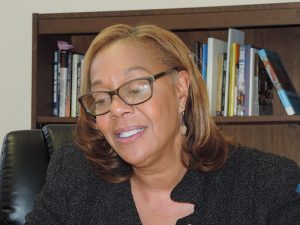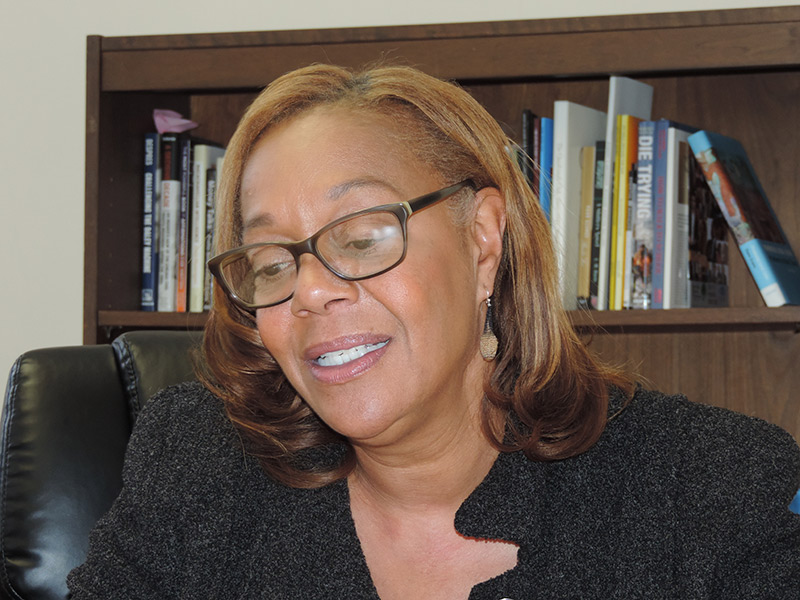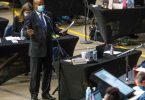 Ald. Leslie Hairston
Ald. Leslie HairstonBy AARON GETTINGER
Staff Writer
Ald. Leslie Hairston is asking the people of the 5th Ward for a sixth term on City Council, articulating a platform stressing parity, developments realized and a sense that she is the candidate with the experience to see projects in development to fruition.
She brought up developments first when asked about her biggest accomplishments, citing the new Sophy Hotel, 1411 E. 53rd St., which she said was built by 75 full-time construction workers and with 60 percent women- and minority-owned enterprise participation, now staffed by 65 full-time workers and decorated with locally produced art.
When Treasure Island closed last summer, Hairston held a community meeting the next week, connecting the public to information about the closing and recruitment of a new supermarket tenant and laid-off workers to new employers through a quickly arranged, subsequent job fair.
Today, Hairston said she looks forward to announcing the new anchor tenant at the University of Chicago-owned Hyde Park Shopping Center — the U. of C. announced a new tenant would be named in the first quarter of this year.
There is also the new Shop & Save supermarket due at 71st and Jeffrey, a long-anticipated development in South Shore, due to have, she said, because of community input, a wine bar, halal meats, seating and hot foods.
“Just like you see in other neighborhoods,” Hairston said, always willing to call out the fundamentally different way the South Side is and is treated compared with the rest of the city. “That was no easy feat, as people well know,”
“But again, it was because of my relationships that I was able to get that grocery store. And, just like with the Starbucks, sometimes the relationships that you build over the years.”
It has been 20 years since Hairston, a South Shore resident with a background in appellate law, was first elected to City Council. Second only to Cook County Board President Toni Preckwinkle (D) in terms of seniority in the storied Hyde Park political world, Hairston sees herself as following in the area’s progressive tradition: she said her predecessor, the legendary Ald. Leon Despres, taught her the importance of hearing what constituents have to say.
“I am independent. I was not a Daley person. I am not a Rahm person,” she said, adding that votes are taken on the issues and that her reputation “speaks for itself, be it shutting down a construction site to whatever it takes to get it done. That’s what I do.”
With Windy City politics in unmistakable flux, Hairston is making the case for continuity. The next thing she mentioned was the Obama Presidential Center, to be located in her ward.
The OPC is critical now and will be critical in the future, Hairston said, saying she was proud of the leadership role she has taken with regards to the project. She acknowledged the opinions present regarding a community benefits agreement. A coalition of activist and community organizations is currently pushing for one between the city, Obama Foundation and U. of C.: and while Ald. Sophia King (4th), Preckwinkle and many other mayoral candidates have endorsed one, neither Hairston nor Obama have.
Hairston said she believed the community was not being heard and, in February 2017, wrote an open letter to the Obama Foundation calling for “a dedicated effort to develop a workforce who builds, trains, operates and maintains all equipment associated with the day-to-day operations of the OPC.” The Foundation released its Community Commitments pledges about workforce development last May.
“Where CBAs have been successful, government has not been involved. Where CBAs have been successful, you have groups with similar interests from the immediately impacted community coming together to form a group that works with the developer — so it would not be the Foundation,” Hairston said. “I think we’ve come past the time for banging the drum. They’ve got to do their homework. They’ve got to find out what their interests are, because there’s no kings in any of the groups.”
This has been Obama’s stated position on CBAs: that signing the one being pressed by the CBA Coalition would unfairly prioritize those groups that make it up over others. There is also the fact that the 5th Ward covers just a small part of Woodlawn. Hairston said she could not control development in a neighborhood she does not represent. She did, however, point out that the proposed OPC site in Jackson Park is surrounded by federally subsidized housing.
“I think that’s a beautiful thing,” she said.
She endorsed its planned location in Jackson Park, noting Chicago’s tradition of having museums in parkland. She expressed some apprehension over the planned closing of Cornell Drive but thinks it would improve Jackson Park’s aesthetics and create, as others have called it, a Museum Campus South.
“II like to look at it as a way to build a map, so that in future if there are other neighborhoods that are going through this type of development or development opportunities, that we can serve as a blueprint for that,” she said. She deferred to the meeting to discuss its terms.
“The goal is to build up the neighborhood, not to get rid of the neighborhood and not to get rid of the neighbors. I think I even heard Barack and Michelle talk about that,” said Hairston. “You want to attract families to their neighborhoods.” Rather than an outmigration of middle class families, as has happened in South Shore and Chatham, Hairston stressed the twin demands to attract newcomers as well as retaining long-standing residents.
“I don’t think you do that by scaring people,” Hairston said again. “I think you do that by putting a plan together that people are a part of, so that they understand it.”
Asked about public safety, Hairston recalled the meeting she held with Ridgewood Court residents and another this month with the police about the third consecutive year of youth violence in Hyde Park on Halloween. She said representatives from a variety of places — from public, charter and private schools and the Catholic archdiocese, for instance — need to come together to address the problem, which she ascribes to youth not from the neighborhood coming to Hyde Park to participate in criminal activity.
“I don’t think this was about kids not having anything to do. This was about kids choosing to do something wrong and targeting our community as the place to do that,” she said.
Asked about criticism of her response to last summer’s police killing of Harith “Snoop” Augustus, a South Shore barber — protesters interrupted her subsequent ward meeting in Hyde Park — Hairston defended her conduct.
“You have to plan these things,” she said. “I am an elected official. I have to respond responsible, and I have to do my homework. I can’t just jump out there because somebody thinks I should.”
She said the activists scheduled another meeting with her but cancelled — “Here’s the thing: they never picked up the phone to ask for a meeting in the first place.” Cooperation cannot be a one-way street: “I would have no reason not to meet with them. We align with them pretty well on the issues, and we need them. And we need them to protest, and I want them to keep on protesting. That’s what we should do.
“I did it in the ‘70s; now it’s their turn,” she said. “I’m doing the law stuff.”
Hairston’s father owned a bar in Woodlawn and was one of the first black McDonald’s franchise owners in Chicago. Her mother was the initial assistant principal at Dyett High School and worked 43 years at Chicago Public Schools. “I grew up here,” she said. “I went to Shoesmith; I went to Lab. I know the old Co-op; when there was a Woolworth’s; when there was a Wimpy’s.” Her childhood home near the Fountain of Time today borders a mixed-income housing development.
“I am a product of these communities, and it is an honor to serve the people who helped to mold me, who helped me in my ideologies, helping me see that it is important to give back, and I have always taken that very seriously,” she said. She attended the University of Wisconsin–Madison and the Loyola University School of Law and previously worked in the Illinois Attorney General’s office and at that of the State’s Attorney’s prosecutor’s office.
After challenger and former Herald editor Gabriel Piemonte attacked her for her attendance record in committee meetings, Hairston said notices only comes out a few days in advance and often conflicts with her busy schedule. In fact, she said she was missing a technology and economic development committee hearing in order to do an interview with this newspaper.
“Sometimes you have to prioritize what gets done, and for me, my ward is the priority,” she explained.
Hairston said most issues in Chicago’s public schools come from its administration, including expenses that come from staffing changes at the top. She stressed the need for parity: “Chicago is segregated, and the way that it operates is segregated. So those that have more get more, and those that have less get less.” An elected school board could change this, Hairston said, as a retreat from a schools-as-a-business mindset. She said the battle over funding would need to be fought in Springfield.
She linked the school funding issues to pensions. She endorsed a financial transaction tax, saying the current structure is too regressive and pushing people out of the city, as well as a head tax tied to inflation and expanded to businesses with 100 employees. She endorsed South Side Ald. David Moore’s (17th) proposed hotel surcharge per stay, not per day, saying that, had it been enacted in 2015, the city would now have $500 million to spend on its pensions.
Hairston rejects outgoing Mayor Rahm Emanuel’s proposed casino outside of additional protections for low-income Chicagoans at most risk of problem gambling. She advocated for the long-proposed new airport in the South Suburbs, which she said would build and stabilize communities as well as provide jobs, and endorsed the legalization of marijuana for revenue.
In addition to uniting Ventra cards-as-payment for Metra as well as CTA buses and the ‘L,’ Hairston is proposing “a complete overview of parking”; namely, free or low-cost parking lot on vacant land with good pedestrian access and connections to transit, fees and benefits possibly shared with a community group. She cautioned patience concerning infrastructural work like road repairs, noting the myriad people, offices, groups and regulations involved with doing a job.
Hairston said she is pursuing reelection because she wants to finish the job she started 20 year ago. She said the ward is better now than it was when she first took office: “We’ve seen economic development, we’ve seen restaurants, and we’ve seen things that we’d never imagined.”
Being an alderman is nonstop, Hairston said: “I think it takes a really unique person to be a good public service. You have to draw upon an incredible amount of knowledge. You have to do research to do it correctly. It is not that you just show up, and it definitely is not a part-time job.”







